HSNS 365: Key Learning Objectives for Mental Health Nursing Practice
VerifiedAdded on 2023/04/21
|6
|1498
|232
Essay
AI Summary
This essay delineates several crucial learning objectives for mental health nursing, emphasizing the importance of understanding the Mental Health Act and its implications for patient rights. It underscores the necessity of grasping the legal and ethical dimensions of mental health nursing, particularly concerning patients with psychiatric illnesses and related ethical dilemmas. The essay highlights the roles and responsibilities of mental health nurses in providing patient-centered treatment with minimal restraints, maintaining patient privacy and confidentiality, and protecting third parties from foreseeable harm. Furthermore, it stresses the development of essential communication skills for building therapeutic relationships with clients and their families, fostering trust, and facilitating effective mental health therapy. The ultimate goal is to cultivate competency standards in nursing, promoting compassionate, person-centered, and holistic care through problem-solving, effective communication, and continuous learning.
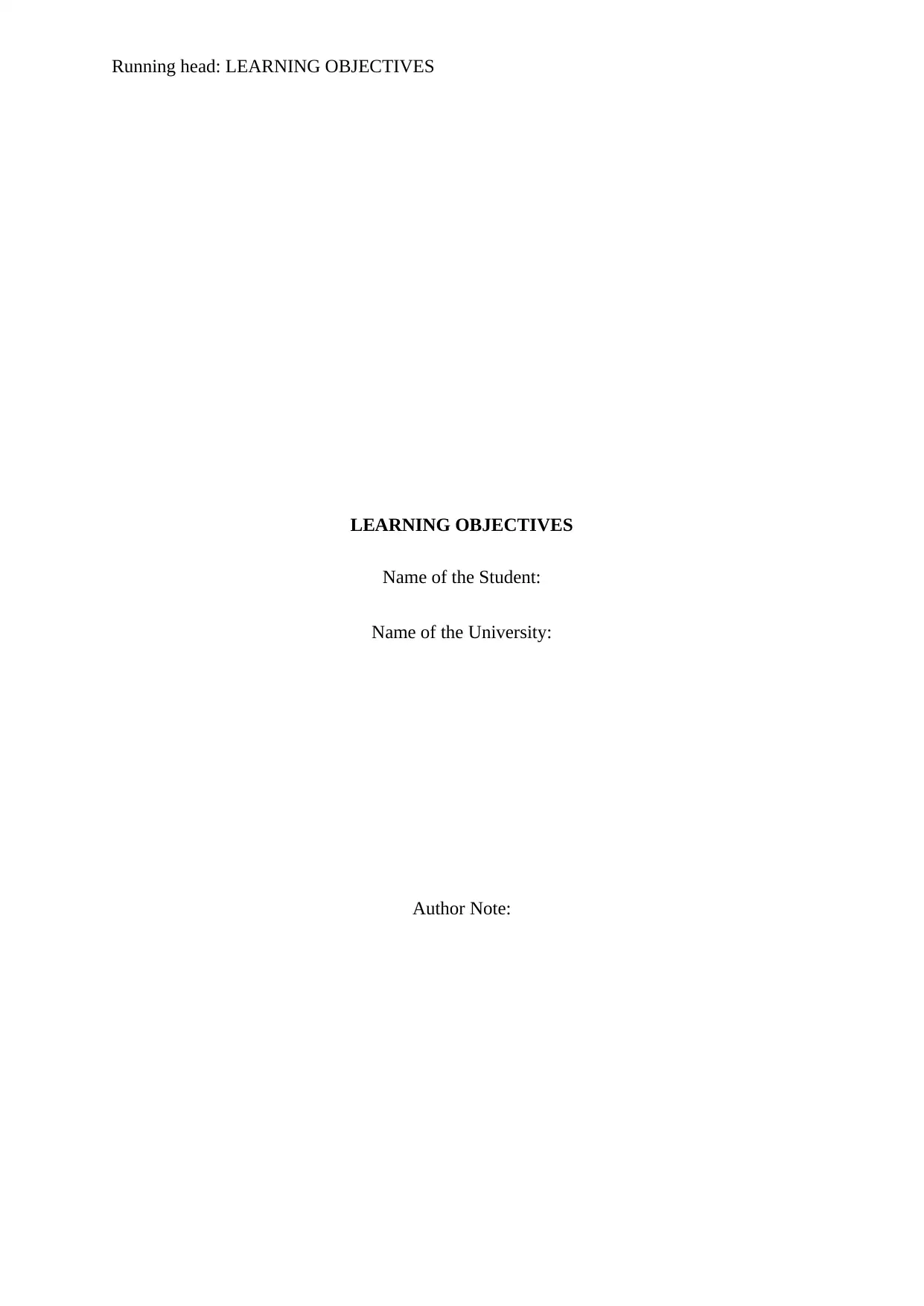
Running head: LEARNING OBJECTIVES
LEARNING OBJECTIVES
Name of the Student:
Name of the University:
Author Note:
LEARNING OBJECTIVES
Name of the Student:
Name of the University:
Author Note:
Paraphrase This Document
Need a fresh take? Get an instant paraphrase of this document with our AI Paraphraser
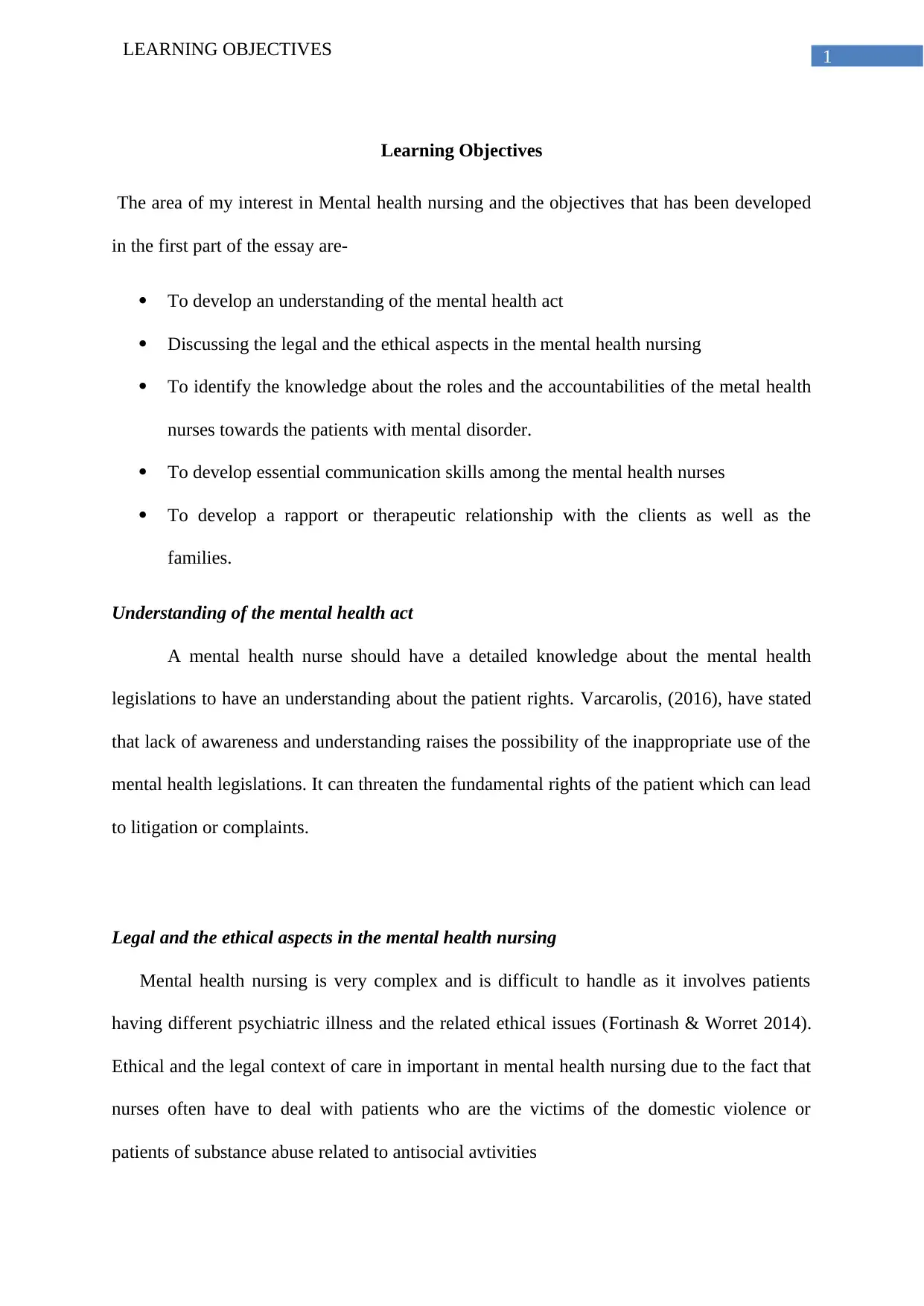
1LEARNING OBJECTIVES
Learning Objectives
The area of my interest in Mental health nursing and the objectives that has been developed
in the first part of the essay are-
To develop an understanding of the mental health act
Discussing the legal and the ethical aspects in the mental health nursing
To identify the knowledge about the roles and the accountabilities of the metal health
nurses towards the patients with mental disorder.
To develop essential communication skills among the mental health nurses
To develop a rapport or therapeutic relationship with the clients as well as the
families.
Understanding of the mental health act
A mental health nurse should have a detailed knowledge about the mental health
legislations to have an understanding about the patient rights. Varcarolis, (2016), have stated
that lack of awareness and understanding raises the possibility of the inappropriate use of the
mental health legislations. It can threaten the fundamental rights of the patient which can lead
to litigation or complaints.
Legal and the ethical aspects in the mental health nursing
Mental health nursing is very complex and is difficult to handle as it involves patients
having different psychiatric illness and the related ethical issues (Fortinash & Worret 2014).
Ethical and the legal context of care in important in mental health nursing due to the fact that
nurses often have to deal with patients who are the victims of the domestic violence or
patients of substance abuse related to antisocial avtivities
Learning Objectives
The area of my interest in Mental health nursing and the objectives that has been developed
in the first part of the essay are-
To develop an understanding of the mental health act
Discussing the legal and the ethical aspects in the mental health nursing
To identify the knowledge about the roles and the accountabilities of the metal health
nurses towards the patients with mental disorder.
To develop essential communication skills among the mental health nurses
To develop a rapport or therapeutic relationship with the clients as well as the
families.
Understanding of the mental health act
A mental health nurse should have a detailed knowledge about the mental health
legislations to have an understanding about the patient rights. Varcarolis, (2016), have stated
that lack of awareness and understanding raises the possibility of the inappropriate use of the
mental health legislations. It can threaten the fundamental rights of the patient which can lead
to litigation or complaints.
Legal and the ethical aspects in the mental health nursing
Mental health nursing is very complex and is difficult to handle as it involves patients
having different psychiatric illness and the related ethical issues (Fortinash & Worret 2014).
Ethical and the legal context of care in important in mental health nursing due to the fact that
nurses often have to deal with patients who are the victims of the domestic violence or
patients of substance abuse related to antisocial avtivities
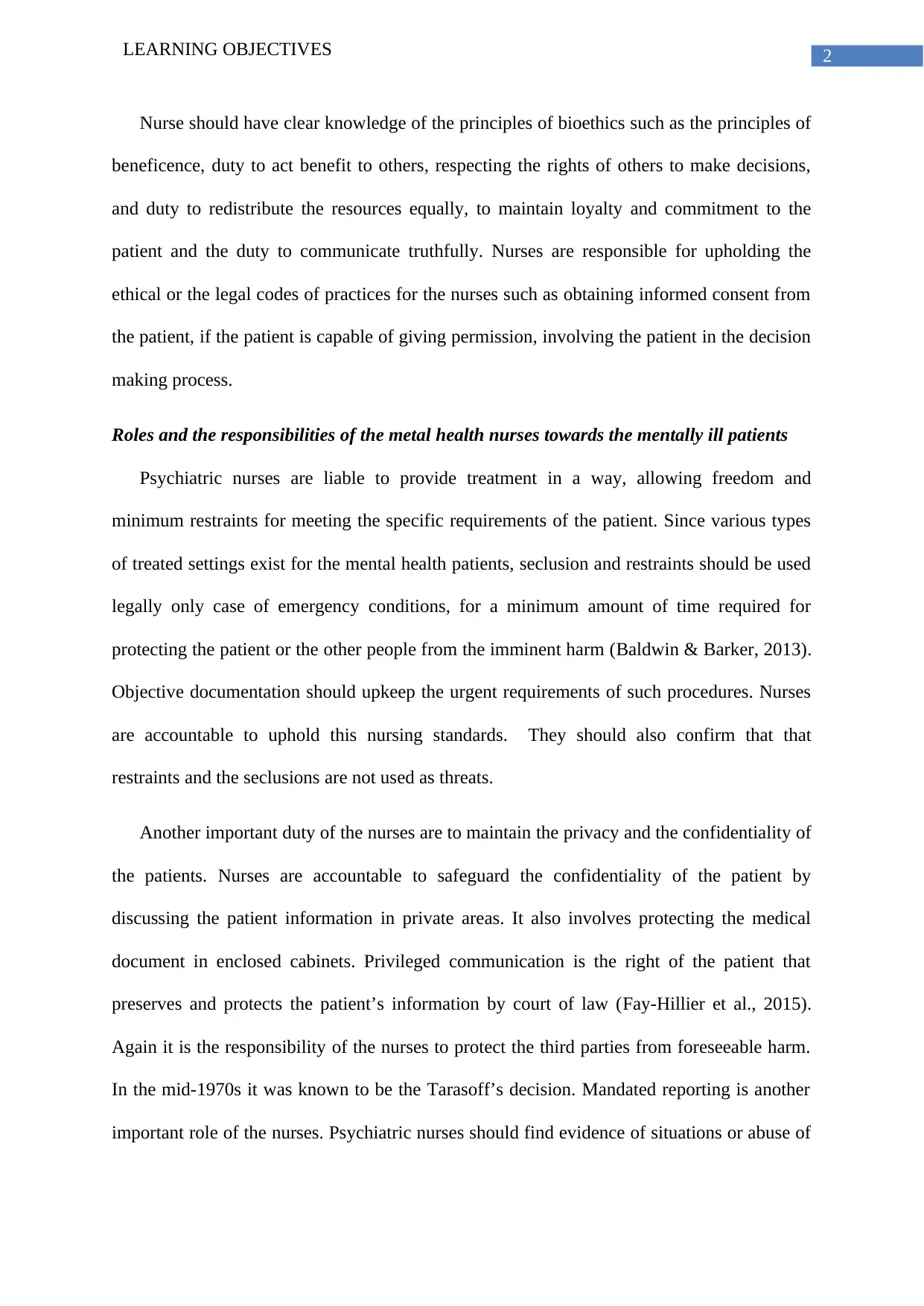
2LEARNING OBJECTIVES
Nurse should have clear knowledge of the principles of bioethics such as the principles of
beneficence, duty to act benefit to others, respecting the rights of others to make decisions,
and duty to redistribute the resources equally, to maintain loyalty and commitment to the
patient and the duty to communicate truthfully. Nurses are responsible for upholding the
ethical or the legal codes of practices for the nurses such as obtaining informed consent from
the patient, if the patient is capable of giving permission, involving the patient in the decision
making process.
Roles and the responsibilities of the metal health nurses towards the mentally ill patients
Psychiatric nurses are liable to provide treatment in a way, allowing freedom and
minimum restraints for meeting the specific requirements of the patient. Since various types
of treated settings exist for the mental health patients, seclusion and restraints should be used
legally only case of emergency conditions, for a minimum amount of time required for
protecting the patient or the other people from the imminent harm (Baldwin & Barker, 2013).
Objective documentation should upkeep the urgent requirements of such procedures. Nurses
are accountable to uphold this nursing standards. They should also confirm that that
restraints and the seclusions are not used as threats.
Another important duty of the nurses are to maintain the privacy and the confidentiality of
the patients. Nurses are accountable to safeguard the confidentiality of the patient by
discussing the patient information in private areas. It also involves protecting the medical
document in enclosed cabinets. Privileged communication is the right of the patient that
preserves and protects the patient’s information by court of law (Fay-Hillier et al., 2015).
Again it is the responsibility of the nurses to protect the third parties from foreseeable harm.
In the mid-1970s it was known to be the Tarasoff’s decision. Mandated reporting is another
important role of the nurses. Psychiatric nurses should find evidence of situations or abuse of
Nurse should have clear knowledge of the principles of bioethics such as the principles of
beneficence, duty to act benefit to others, respecting the rights of others to make decisions,
and duty to redistribute the resources equally, to maintain loyalty and commitment to the
patient and the duty to communicate truthfully. Nurses are responsible for upholding the
ethical or the legal codes of practices for the nurses such as obtaining informed consent from
the patient, if the patient is capable of giving permission, involving the patient in the decision
making process.
Roles and the responsibilities of the metal health nurses towards the mentally ill patients
Psychiatric nurses are liable to provide treatment in a way, allowing freedom and
minimum restraints for meeting the specific requirements of the patient. Since various types
of treated settings exist for the mental health patients, seclusion and restraints should be used
legally only case of emergency conditions, for a minimum amount of time required for
protecting the patient or the other people from the imminent harm (Baldwin & Barker, 2013).
Objective documentation should upkeep the urgent requirements of such procedures. Nurses
are accountable to uphold this nursing standards. They should also confirm that that
restraints and the seclusions are not used as threats.
Another important duty of the nurses are to maintain the privacy and the confidentiality of
the patients. Nurses are accountable to safeguard the confidentiality of the patient by
discussing the patient information in private areas. It also involves protecting the medical
document in enclosed cabinets. Privileged communication is the right of the patient that
preserves and protects the patient’s information by court of law (Fay-Hillier et al., 2015).
Again it is the responsibility of the nurses to protect the third parties from foreseeable harm.
In the mid-1970s it was known to be the Tarasoff’s decision. Mandated reporting is another
important role of the nurses. Psychiatric nurses should find evidence of situations or abuse of
⊘ This is a preview!⊘
Do you want full access?
Subscribe today to unlock all pages.

Trusted by 1+ million students worldwide
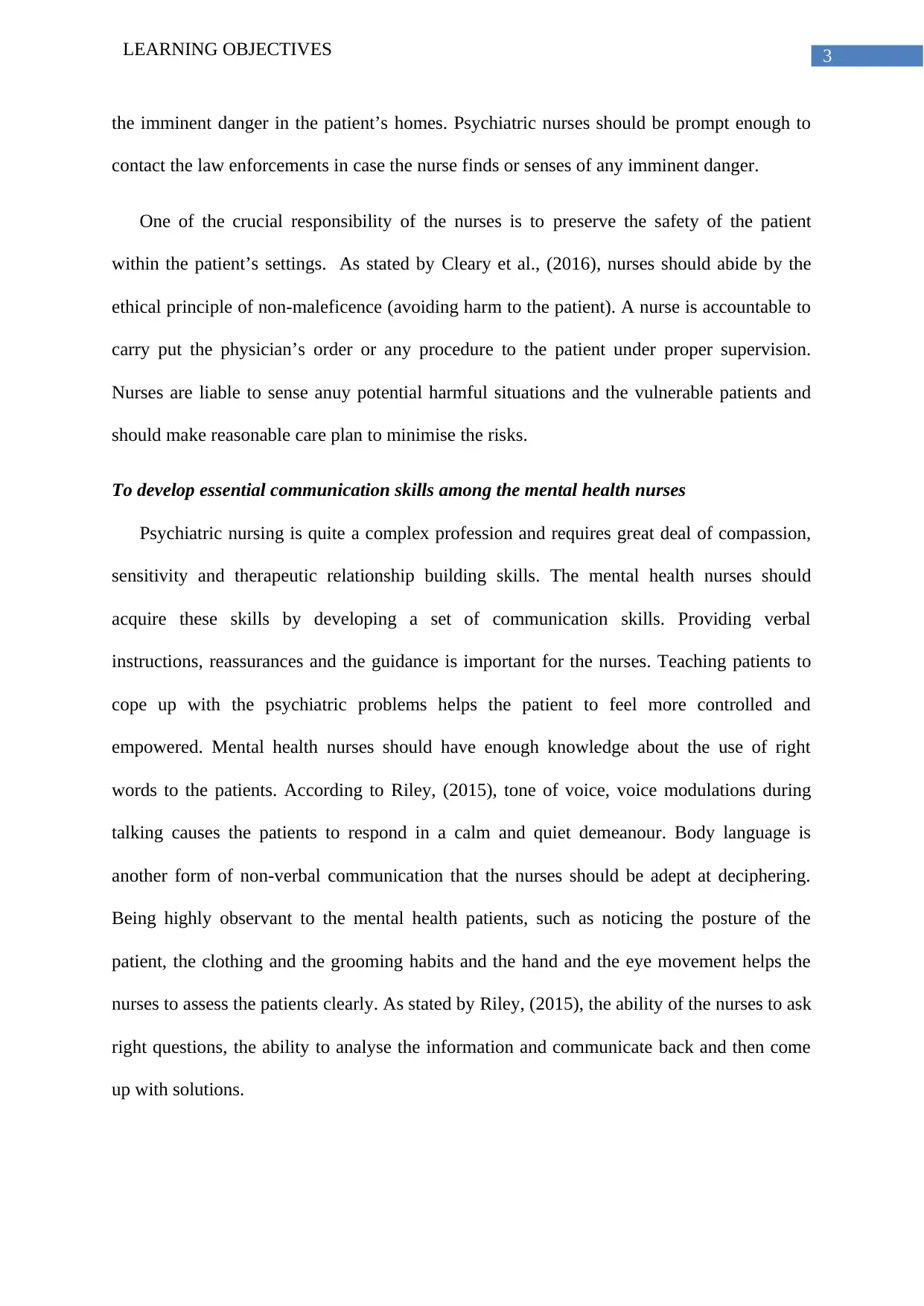
3LEARNING OBJECTIVES
the imminent danger in the patient’s homes. Psychiatric nurses should be prompt enough to
contact the law enforcements in case the nurse finds or senses of any imminent danger.
One of the crucial responsibility of the nurses is to preserve the safety of the patient
within the patient’s settings. As stated by Cleary et al., (2016), nurses should abide by the
ethical principle of non-maleficence (avoiding harm to the patient). A nurse is accountable to
carry put the physician’s order or any procedure to the patient under proper supervision.
Nurses are liable to sense anuy potential harmful situations and the vulnerable patients and
should make reasonable care plan to minimise the risks.
To develop essential communication skills among the mental health nurses
Psychiatric nursing is quite a complex profession and requires great deal of compassion,
sensitivity and therapeutic relationship building skills. The mental health nurses should
acquire these skills by developing a set of communication skills. Providing verbal
instructions, reassurances and the guidance is important for the nurses. Teaching patients to
cope up with the psychiatric problems helps the patient to feel more controlled and
empowered. Mental health nurses should have enough knowledge about the use of right
words to the patients. According to Riley, (2015), tone of voice, voice modulations during
talking causes the patients to respond in a calm and quiet demeanour. Body language is
another form of non-verbal communication that the nurses should be adept at deciphering.
Being highly observant to the mental health patients, such as noticing the posture of the
patient, the clothing and the grooming habits and the hand and the eye movement helps the
nurses to assess the patients clearly. As stated by Riley, (2015), the ability of the nurses to ask
right questions, the ability to analyse the information and communicate back and then come
up with solutions.
the imminent danger in the patient’s homes. Psychiatric nurses should be prompt enough to
contact the law enforcements in case the nurse finds or senses of any imminent danger.
One of the crucial responsibility of the nurses is to preserve the safety of the patient
within the patient’s settings. As stated by Cleary et al., (2016), nurses should abide by the
ethical principle of non-maleficence (avoiding harm to the patient). A nurse is accountable to
carry put the physician’s order or any procedure to the patient under proper supervision.
Nurses are liable to sense anuy potential harmful situations and the vulnerable patients and
should make reasonable care plan to minimise the risks.
To develop essential communication skills among the mental health nurses
Psychiatric nursing is quite a complex profession and requires great deal of compassion,
sensitivity and therapeutic relationship building skills. The mental health nurses should
acquire these skills by developing a set of communication skills. Providing verbal
instructions, reassurances and the guidance is important for the nurses. Teaching patients to
cope up with the psychiatric problems helps the patient to feel more controlled and
empowered. Mental health nurses should have enough knowledge about the use of right
words to the patients. According to Riley, (2015), tone of voice, voice modulations during
talking causes the patients to respond in a calm and quiet demeanour. Body language is
another form of non-verbal communication that the nurses should be adept at deciphering.
Being highly observant to the mental health patients, such as noticing the posture of the
patient, the clothing and the grooming habits and the hand and the eye movement helps the
nurses to assess the patients clearly. As stated by Riley, (2015), the ability of the nurses to ask
right questions, the ability to analyse the information and communicate back and then come
up with solutions.
Paraphrase This Document
Need a fresh take? Get an instant paraphrase of this document with our AI Paraphraser
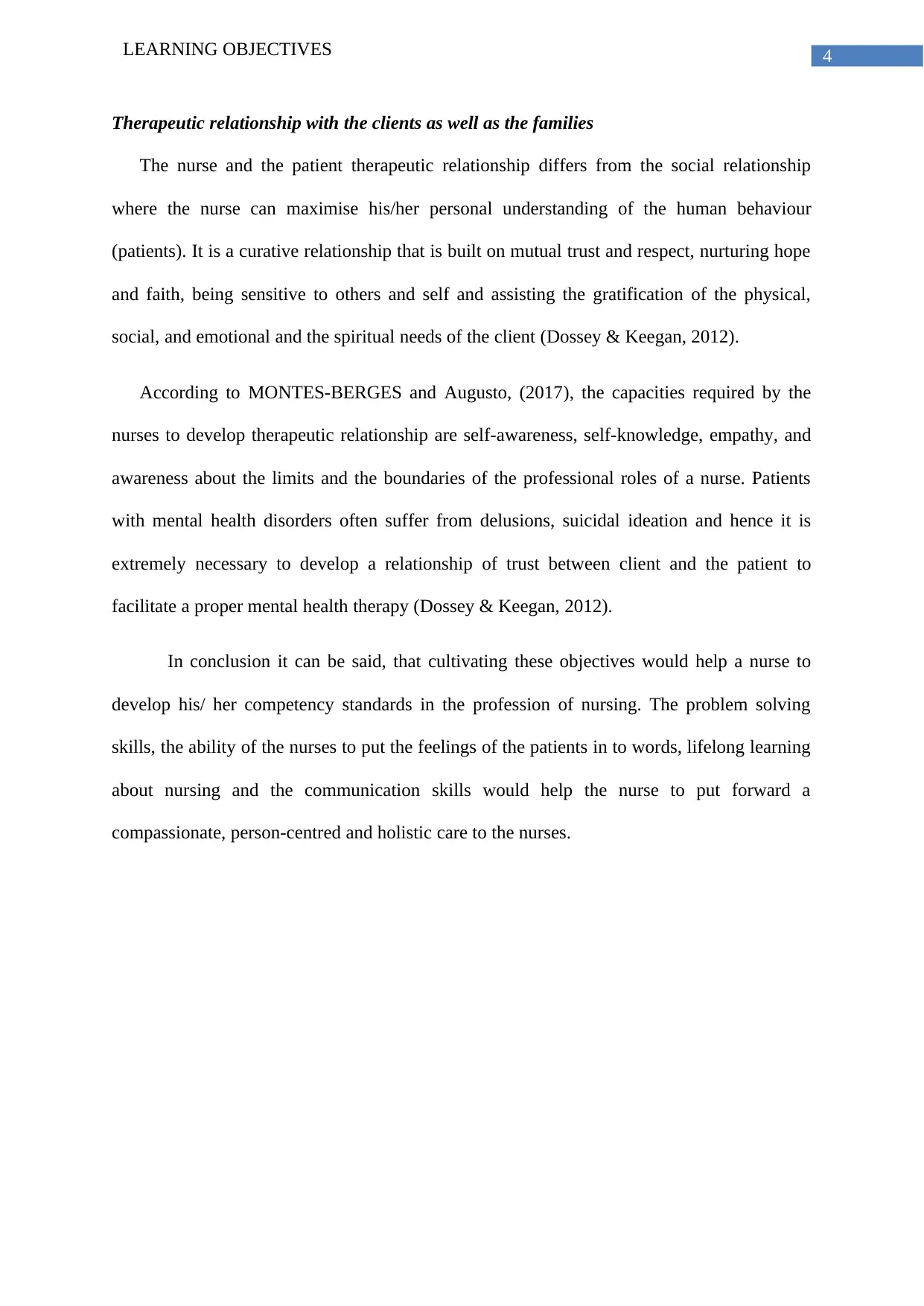
4LEARNING OBJECTIVES
Therapeutic relationship with the clients as well as the families
The nurse and the patient therapeutic relationship differs from the social relationship
where the nurse can maximise his/her personal understanding of the human behaviour
(patients). It is a curative relationship that is built on mutual trust and respect, nurturing hope
and faith, being sensitive to others and self and assisting the gratification of the physical,
social, and emotional and the spiritual needs of the client (Dossey & Keegan, 2012).
According to MONTES‐BERGES and Augusto, (2017), the capacities required by the
nurses to develop therapeutic relationship are self-awareness, self-knowledge, empathy, and
awareness about the limits and the boundaries of the professional roles of a nurse. Patients
with mental health disorders often suffer from delusions, suicidal ideation and hence it is
extremely necessary to develop a relationship of trust between client and the patient to
facilitate a proper mental health therapy (Dossey & Keegan, 2012).
In conclusion it can be said, that cultivating these objectives would help a nurse to
develop his/ her competency standards in the profession of nursing. The problem solving
skills, the ability of the nurses to put the feelings of the patients in to words, lifelong learning
about nursing and the communication skills would help the nurse to put forward a
compassionate, person-centred and holistic care to the nurses.
Therapeutic relationship with the clients as well as the families
The nurse and the patient therapeutic relationship differs from the social relationship
where the nurse can maximise his/her personal understanding of the human behaviour
(patients). It is a curative relationship that is built on mutual trust and respect, nurturing hope
and faith, being sensitive to others and self and assisting the gratification of the physical,
social, and emotional and the spiritual needs of the client (Dossey & Keegan, 2012).
According to MONTES‐BERGES and Augusto, (2017), the capacities required by the
nurses to develop therapeutic relationship are self-awareness, self-knowledge, empathy, and
awareness about the limits and the boundaries of the professional roles of a nurse. Patients
with mental health disorders often suffer from delusions, suicidal ideation and hence it is
extremely necessary to develop a relationship of trust between client and the patient to
facilitate a proper mental health therapy (Dossey & Keegan, 2012).
In conclusion it can be said, that cultivating these objectives would help a nurse to
develop his/ her competency standards in the profession of nursing. The problem solving
skills, the ability of the nurses to put the feelings of the patients in to words, lifelong learning
about nursing and the communication skills would help the nurse to put forward a
compassionate, person-centred and holistic care to the nurses.
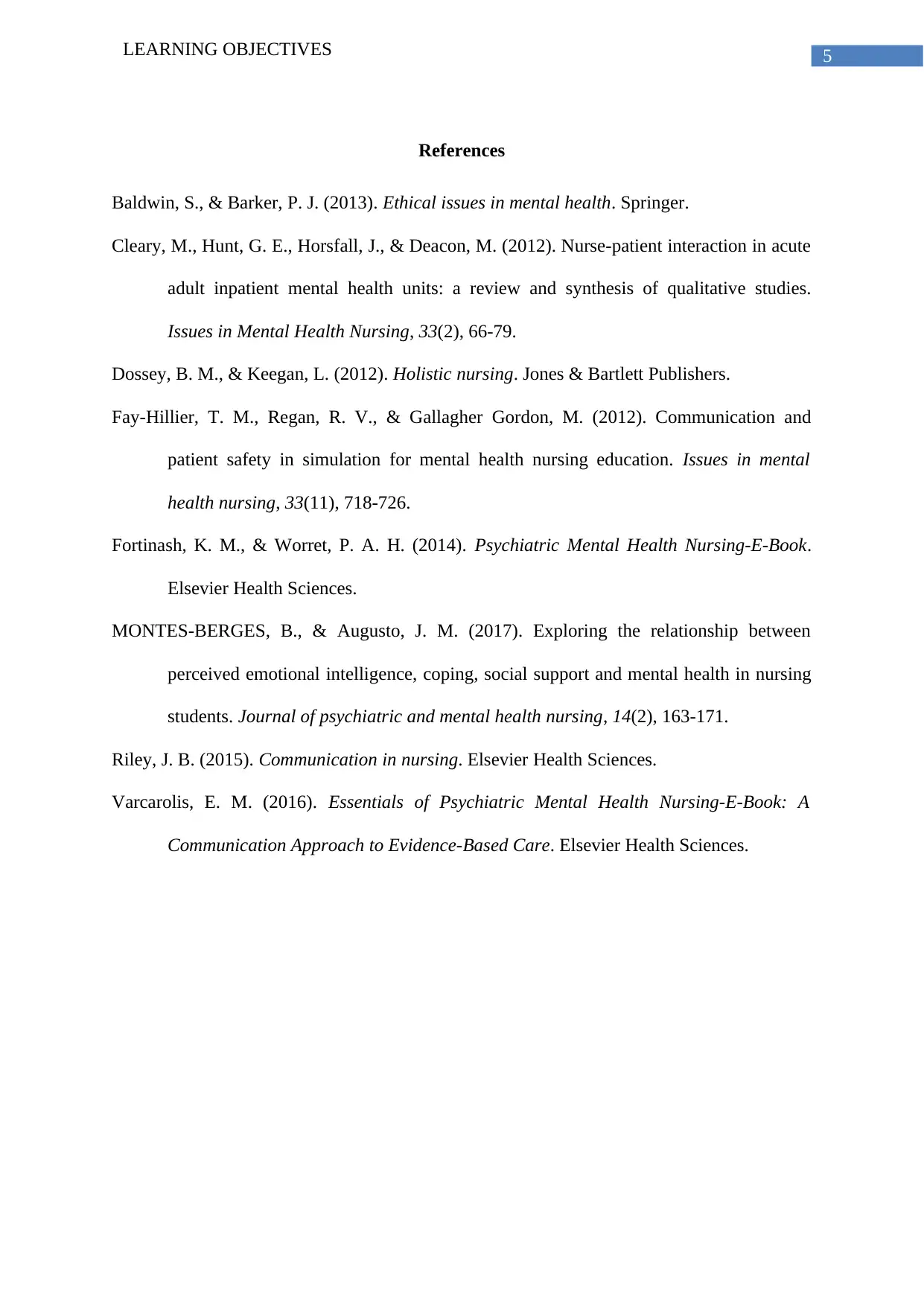
5LEARNING OBJECTIVES
References
Baldwin, S., & Barker, P. J. (2013). Ethical issues in mental health. Springer.
Cleary, M., Hunt, G. E., Horsfall, J., & Deacon, M. (2012). Nurse-patient interaction in acute
adult inpatient mental health units: a review and synthesis of qualitative studies.
Issues in Mental Health Nursing, 33(2), 66-79.
Dossey, B. M., & Keegan, L. (2012). Holistic nursing. Jones & Bartlett Publishers.
Fay-Hillier, T. M., Regan, R. V., & Gallagher Gordon, M. (2012). Communication and
patient safety in simulation for mental health nursing education. Issues in mental
health nursing, 33(11), 718-726.
Fortinash, K. M., & Worret, P. A. H. (2014). Psychiatric Mental Health Nursing-E-Book.
Elsevier Health Sciences.
MONTES‐BERGES, B., & Augusto, J. M. (2017). Exploring the relationship between
perceived emotional intelligence, coping, social support and mental health in nursing
students. Journal of psychiatric and mental health nursing, 14(2), 163-171.
Riley, J. B. (2015). Communication in nursing. Elsevier Health Sciences.
Varcarolis, E. M. (2016). Essentials of Psychiatric Mental Health Nursing-E-Book: A
Communication Approach to Evidence-Based Care. Elsevier Health Sciences.
References
Baldwin, S., & Barker, P. J. (2013). Ethical issues in mental health. Springer.
Cleary, M., Hunt, G. E., Horsfall, J., & Deacon, M. (2012). Nurse-patient interaction in acute
adult inpatient mental health units: a review and synthesis of qualitative studies.
Issues in Mental Health Nursing, 33(2), 66-79.
Dossey, B. M., & Keegan, L. (2012). Holistic nursing. Jones & Bartlett Publishers.
Fay-Hillier, T. M., Regan, R. V., & Gallagher Gordon, M. (2012). Communication and
patient safety in simulation for mental health nursing education. Issues in mental
health nursing, 33(11), 718-726.
Fortinash, K. M., & Worret, P. A. H. (2014). Psychiatric Mental Health Nursing-E-Book.
Elsevier Health Sciences.
MONTES‐BERGES, B., & Augusto, J. M. (2017). Exploring the relationship between
perceived emotional intelligence, coping, social support and mental health in nursing
students. Journal of psychiatric and mental health nursing, 14(2), 163-171.
Riley, J. B. (2015). Communication in nursing. Elsevier Health Sciences.
Varcarolis, E. M. (2016). Essentials of Psychiatric Mental Health Nursing-E-Book: A
Communication Approach to Evidence-Based Care. Elsevier Health Sciences.
⊘ This is a preview!⊘
Do you want full access?
Subscribe today to unlock all pages.

Trusted by 1+ million students worldwide
1 out of 6
Related Documents
Your All-in-One AI-Powered Toolkit for Academic Success.
+13062052269
info@desklib.com
Available 24*7 on WhatsApp / Email
![[object Object]](/_next/static/media/star-bottom.7253800d.svg)
Unlock your academic potential
Copyright © 2020–2025 A2Z Services. All Rights Reserved. Developed and managed by ZUCOL.





